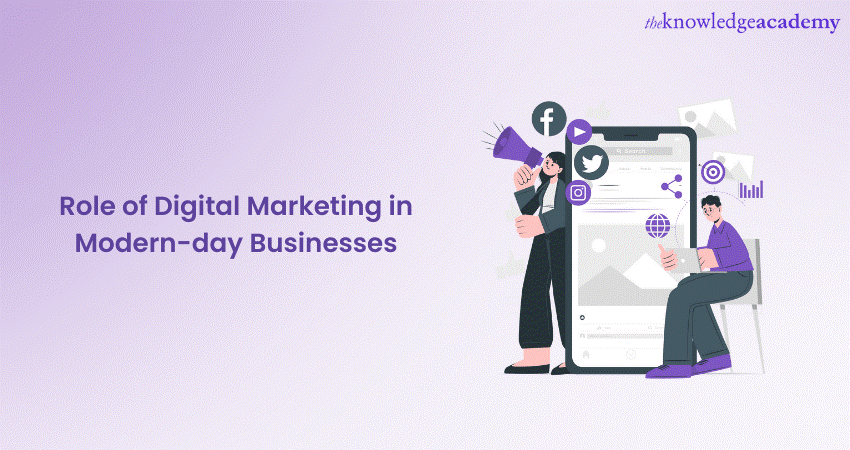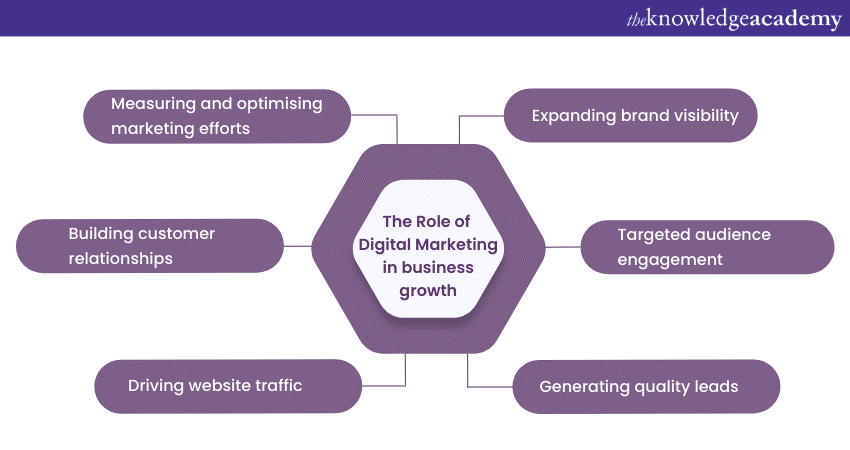We may not have the course you’re looking for. If you enquire or give us a call on +44 1344 203999 and speak to our training experts, we may still be able to help with your training requirements.
Training Outcomes Within Your Budget!
We ensure quality, budget-alignment, and timely delivery by our expert instructors.

Modern-day businesses Highly rely on Digital Marketing strategies to reach their audience and achieve their marketing goals. It amalgamates a wide range of activities, each playing a unique role in promoting products or services in the online realm. Therefore, it’s crucial to understand the Role of Digital Marketing for businesses to leverage its potential and stay ahead in the competitive market. This comprehensive blog will explore the Role of Digital Marketing in modern-day businesses and how they contribute to overall business growth.
Table of Contents
1) Digital Marketing and its components
2) The Role of Digital Marketing in business growth
a) Expanding brand visibility
b) Targeted audience engagement
c) Generating quality leads
d) Driving website leads
e) Building customer relationships
f) Measuring and optimising marketing efforts
g) Achieving impressive ROI
3) Conclusion
Components of Digital Marketing
One can define Digital Marketing as the use of digital platforms to promote products, services, or brands. It consists of reaching out to potential customers through various online avenues, such as search engines, Social Media, Email campaigns, and more. The Role of Digital Marketing lies in its ability to target specific audiences, generate leads, drive traffic, and ultimately convert prospects into customers.
Moreover, Digital Marketing comprises various components, each serving a distinct purpose in the overall marketing strategy. Let's explore some of the essential components of Digital Marketing in detail:
1) Search Engine Optimisation (SEO): SEO focuses on improving a website's visibility in Search Engine results. It involves optimising web pages, creating quality content, and obtaining backlinks to enhance organic rankings.
2) Search Engine Marketing (SEM): SEM involves paid advertising to gain visibility on search results. It includes tactics like Pay-per-click (PPC) advertising, display ads, and remarketing campaigns.
3) Social Media Marketing (SMM): SMM utilises Social Media platforms to engage with the audience, build brand awareness, and lead traffic to the website. It involves creating compelling content, running ads, and leveraging influencer partnerships.
4) Content marketing: Content marketing emphasises on the creation and distribution of valuable, consistent, and relevant content. It helps attract and retain a defined audience. It includes blog posts, articles, videos, infographics, and more.
5) Email marketing: Email marketing involves sending targeted messages directly to a subscriber's inbox. It helps nurture leads, build customer relationships, and promote products or services effectively.
6) Influencer marketing: Influencer marketing leverages the popularity and reach of influential individuals on Social Media to promote products or services. It involves collaborating with influencers with a significant following in a specific niche.
7) Affiliate marketing: Affiliate Digital Marketing enables businesses to partner with affiliates who boost their products or services in exchange for a commission. It helps expand the reach and drive sales through affiliate referrals.
8) Mobile marketing: Mobile marketing focuses on reaching customers through their mobile devices. It includes mobile ads, SMS marketing, mobile apps, and optimising websites for mobile users.
9) Video marketing: Video marketing utilises engaging videos to promote products, services, or brands. It includes creating informative tutorials, product demonstrations, testimonials, and viral videos to captivate the audience.
10) Analytics and data-driven marketing: Analytics and data-driven Digital Marketing involve gathering and analysing data to make informed decisions. It helps measure the success of marketing campaigns, identify trends, and optimise strategies for better results.
Unlock your Digital Marketing potential with our Digital Marketing Masterclass and take your skills to the next level!
The Role of Digital Marketing in business growth
Digital Marketing is vital in driving business growth and success in today's technological era. With the ever-increasing reliance on online platforms and the growing number of internet users, businesses need to leverage Digital Marketing strategies to effectively reach their target audience, build brand awareness, and achieve their marketing objectives. This section of the blog will explore the Role of Digital Marketing in greater detail:

Expanding brand visibility
Digital Marketing allows businesses to enhance their brand visibility and reach a wider audience. Through various channels like search engines, social media platforms, and email campaigns, businesses can promote their products or services to potential customers globally.
With the implementation of effective Digital Marketing strategies, businesses can increase their online presence. This ensures that their brand remains visible to their target audience.
Targeted audience engagement
One of the key roles of Digital Marketing is the fact that it can target specific audiences. By employing tactics like SEO, businesses can optimise their website content in order to rank better in the search results for relevant keywords. This ensures that their website is visible to users actively searching for products or services in their industry.
Further, Social Media marketing helps businesses target specific demographics, interests, and behaviours, ensuring that their content reaches the right audience. Moreover, engaging with the target audience through personalised messaging and tailored content fosters stronger connections and increases the likelihood of conversions.
Generating quality leads
The Role of Digital Marketing also includes generating high-quality leads for businesses. By leveraging various lead-generating tools, businesses can capture valuable information from potential customers, like email addresses or contact details.
This allows businesses to nurture these leads through targeted email marketing campaigns. It also provides them with relevant information and incentives to convert into customers. By employing lead scoring and segmentation techniques, businesses can focus their resources on leads that are more likely to convert. As a result, they can optimise their sales funnel and maximise their conversion rates.
Enhance your Social Media prowess and drive impactful Digital Marketing campaigns with our introductory Social Media Masterclass!
Driving website traffic
A well-executed Digital Marketing strategy can drive a large amount of traffic to a business's website. Through SEO efforts, businesses can improve their website's organic rankings, increasing visibility and higher click-through rates.
Further, Social Media marketing and paid advertising campaigns can also drive targeted traffic to specific landing pages or product pages. By attracting more visitors to their websites, businesses have a greater opportunity to showcase their offerings, educate potential customers, and ultimately drive conversions.
Building customer relationships
Another key Role of Digital Marketing is that it facilitates ongoing customer engagement and relationship building. Through social media platforms, businesses can interact with their customers, respond to inquiries, and address concerns promptly. Engaging customers through email marketing allows businesses to provide valuable content, personalised recommendations, and exclusive offers.
This strengthens the relationship and fosters customer loyalty. By staying connected with customers through digital channels, businesses can continuously nurture and retain their customer base. As a result, they can enjoy repetitive purchases and positive word-of-mouth referrals.

Measuring and optimising marketing efforts
Digital Marketing also provides businesses with extensive data and analytics to measure the success of their marketing campaigns. Through various tools and platforms, businesses can track website traffic and user behaviours. They can also keep an eye on conversion rates and other key performance indicators.
This data-driven approach allows businesses to gain insights into their functioning, enabling them to optimise their marketing efforts and allocate resources effectively. By continuously monitoring and analysing campaign performance, businesses can make data-backed decisions to refine their strategies and maximise their Return on Investment (ROI).
Achieving impressive ROI
One of the aspects that sets Digital Marketing ahead in the Digital Marketing vs Traditional Marketing debate is that it helps businesses achieve impressive ROI. It focuses on the amount of money invested in a marketing campaign and helps monitoring the investment made and the returns generated. As it is more results-driven with optimum tracking of the investment made and its significant return. Digital Marketing offers a more cost-effective way to run ads and reach larger target markets.
Strategies like Pay-Per-Click helps companies to set specific budgets and only pay for the ads that were clicked or viewed. It also includes personalised ads to target a specific target audience providing better Conversion Rate which eventually leads to impressive ROI.
Conclusion
Digital Marketing plays a vital role in the modern-day marketing domain. Understanding the Role of Digital Marketing, implementing effective strategies, and staying updated on industry trends are key to achieving success. We hope that this blog helped you understand the potential of Digital Marketing in many ways to drive growth and scalability.
Transform your Digital Marketing skills with our comprehensive Digital Marketing Courses and stay ahead in the ever-evolving digital landscape!
Frequently Asked Questions
Upcoming Digital Marketing Resources Batches & Dates
Date
 Digital Marketing Course
Digital Marketing Course
Fri 17th Jan 2025
Fri 21st Feb 2025
Fri 4th Apr 2025
Fri 6th Jun 2025
Fri 25th Jul 2025
Fri 7th Nov 2025
Fri 26th Dec 2025







 Top Rated Course
Top Rated Course


 If you wish to make any changes to your course, please
If you wish to make any changes to your course, please


